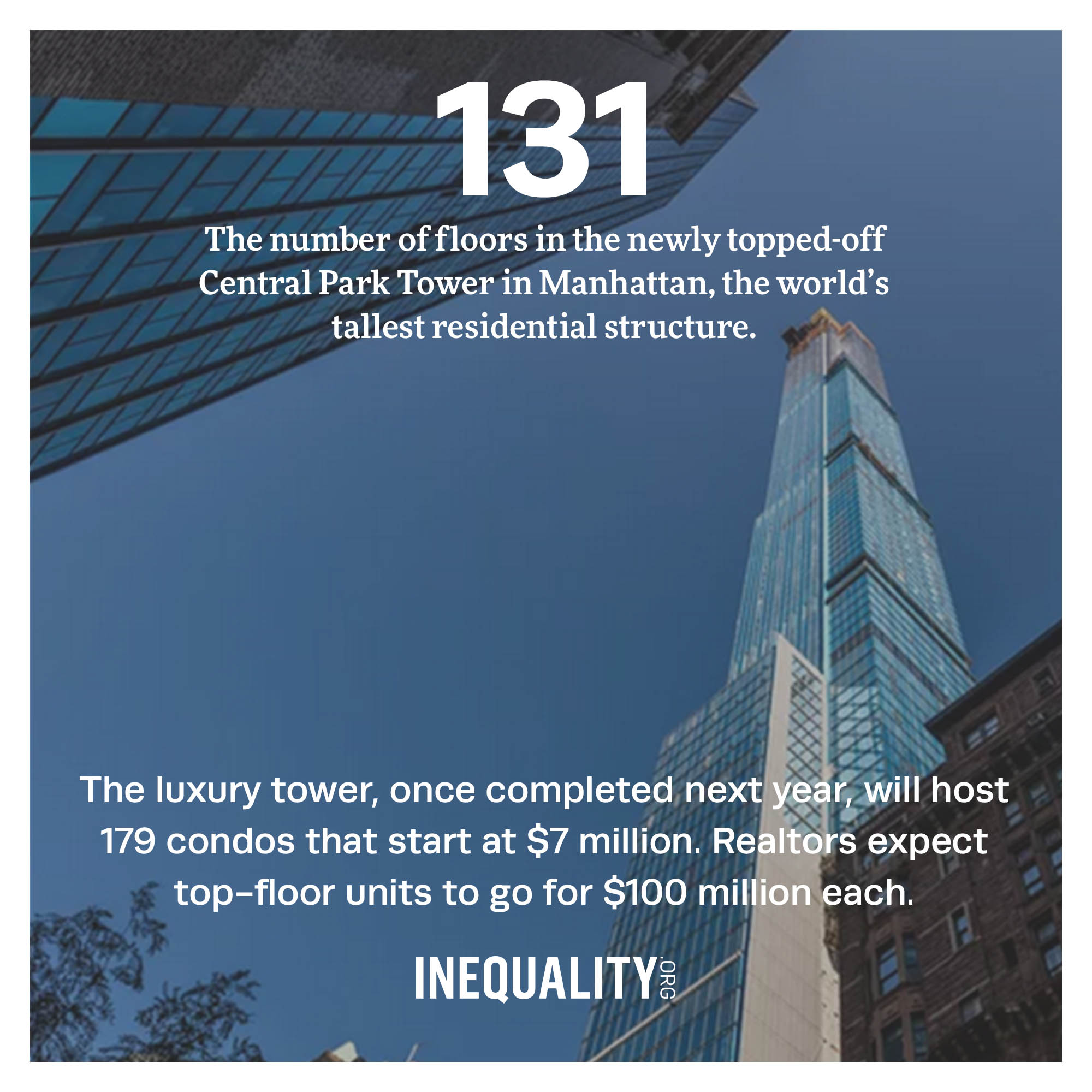At the 50 publicly traded U.S. firms with the widest pay gaps in 2018, typical employees would have to work at least 1,000 years to earn what their CEO made in just one!
|
THIS WEEK
|
The Census Bureau announced last week that income inequality in the United States has hit a 50-year record high. That didn’t surprise us. Our latest annual Institute for Policy Studies Executive Excess report, released this morning, shows that at the 50 publicly traded U.S. firms with the widest pay gaps in 2018, typical employees would have to work at least 1,000 years to earn what their CEO made in just one!
This new report, by my Inequality.org colleagues Sarah Anderson and Sam Pizzigati, is getting coverage in major media outlets, with special attention to the report’s call for higher taxes on corporations with excessive gaps between executive and worker pay.
Proposals along that line are now pending in seven state legislatures, and this morning Senator Bernie Sanders released a plan for such a tax penalty at the federal level. The goal of all these proposals: Let’s have no more inequality records for the U.S. Census Bureau to register.
Chuck Collins, for the Institute for Policy Studies Inequality.org team |
|
|
|
|
INEQUALITY BY THE NUMBERS
|
 |
|
|
|
|
|
|
FACES ON THE FRONTLINES
|
 |
Grad Students Demand Workplace Democracy
|
| In 2016, the National Labor Relations Board ruled that student researchers and teaching assistants at private U.S. universities have the right to collectively bargain, and that ruling started a wave of grad student organizing. But earlier this month, the Trump-appointed NLRB made an about-face and ruled that those same grad students could not be considered workers and don't have any right to bargain collectively. Despite this new NLRB ruling, grad students know exactly how much the highly unequal private university system depends on their labor. These students are fighting back, taking aim at both the NLRB and their institutions. We have more this week on their campaigns. |
|
|
|
|
WORDS OF WISDOM
|
 |
|
|
|
|
|
PETULANT PLUTOCRAT
OF THE WEEK
|
 |
A Superstar CEO Takes One Greedy Step Too Far
|
| Gigs! Disruption! Cubicle killers! Adam Neumann figured he could parlay trendy buzzwords into an office rental goliath that could make him rich. WeWork, the company he co-founded nine years ago, took out long-term office building leases and subleased space to start-ups and freelancers, a business model that soon flopped. In 2018, WeWork collected $1.8 billion in revenue and still ended the year $1.6 billion in the red. But Neumann himself has done quite well, in part by buying up buildings and renting the space back to WeWork. Neumann also tried trademarking — in his own name — the “We” in WeWork. Amid the resulting furor, he later returned the $5.9 million he charged WeWork for rights to the “We.” That furor only intensified this summer when Neumann sold off $700 million of his WeWork shares before a planned IPO, a clear case of trying to get out while the getting seemed good. That maneuver chopped two-thirds off WeWork’s $47 billion market value and had WeWork investors demanding Neumann’s head. They got it. Neumann last week stepped down as WeWork CEO. The good news for Neumann? He still has plenty of pillows to rest his head on. He owns five homes worth a combined $80 million. |
|
|
|
|
GREED AT A GLANCE
|
 |
|
|
|
|
|
|
TOO MUCH
|
 |
| The Philosophers Exploring Limits on Wealth |
| Letting small slivers of a population amass as much wealth as they can grab might not be such a hot idea after all. Two decades into the 21st century, a half-century into an America growing ever more unequal, the notion that some people can become too rich is finally seeping into our mainstream political discourse. This sense that grand concentrations of private wealth endanger our common well-being is deepening all around the world, so much so that the every-billionaire-a-policy-failure perspective now has a philosophic label: limitarianism. Inequality.org co-editor Sam Pizzigati, author of The Case for a Maximum Wage, has more. |
|
|
|
|
|
|
MUST READS
|
This week on Inequality.org
Peter Certo, The Case for Impeachment Goes Way Beyond Ukraine. How Democrats risk sending the message that the worst thing a president can do isn’t to attack the people or the planet, but a fellow elite.
Negin Owliaei, No One Should Have To Bargain For Health Care. As the GM strike shows, employers use their workers’ health as a bargaining chip. Medicare for All would end that.
Elsewhere on the Web
Elizabeth McNichol, State Taxes on Inherited Wealth, Center on Budget and Policy Priorities. A look at an important opportunity most U.S. states are missing.
Louis Menand, Is Meritocracy Making Everyone Miserable? New Yorker. An insightful look at the debate over inequality and “merit.”
Eric Foner, The Vexed Meaning of Equality in Gilded Age America, Nation. How white supremacy derailed the struggle against economic inequality in the decades after the Civil War.
Richard Wilkinson, Kate Pickett, and Wanda Wyporska, Effects of inequality go beyond economics, Guardian. Unequal societies enhance status anxieties in all income groups.
Alan White, Student Loan Crisis Driving Racial Wealth Gap, Credit Slips. Why canceling student loan debt would play an important role in closing the racial wealth divide.
Dale Buss, Rise of CEO Pay Issue Is Underscored By Unionists’ Concerns In GM Strike, Chief Executive. The UAW strike offers more evidence that outrageously wide CEO-worker pay ratios have become a top-tier concern.
Matt Stoller, WeWork and Counterfeit Capitalism, BIG. How deep-pocket financiers use predatory pricing to kill off business competition and then profit via the monopoly that pricing creates. |
|
|
|
|
A FINAL FIGURE
|
 |
|
|
|
|
|
|